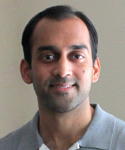The Way I See It
Unconventional wisdom in developing countries
By Sanju Patel ’13
Everywhere I went in Liberia there was a story — and the stories provided perspective and an opportunity for solution-focused thinking. That was my feeling after spending two weeks in the tiny country in West Africa in October. I did so as a Jones School MBA student in Distinguished Research Professor of Management Marc Epstein’s two-term course, Commercializing Technology and Social Entrepreneurship in Developing Countries.
I encountered Mo, a 29-year-old driver in the capital city of Monrovia. His dream: Go back to school and finish what he started in the fifth grade. Attempting to avoid potholes in the road, Mo explained that he left school to earn money and escaped with his family when the civil war started.
Underpinned by a constitution similar to the U.S., Liberia was formed by volunteers and freed slaves in 1847. By the mid-20th century, the country started to receive foreign investments for modernization. However, in the 1980s, a military coup set off two civil wars until 2003. The country’s infrastructure, education, health care and economy collapsed. Nongovernmental organizations (NGOs) rushed to help, but the persistence of corruption and the decrease of funding during the global recession of 2008 presented challenges.
When I enrolled in Epstein’s class to create business solutions for health care and education in developing countries, I was inspired to bring technologies designed by Rice University student engineers and affiliates to alleviate the challenges, such as a mechanical IV flow regulator to assist with rehydration therapy and a solar-powered laptop used for education.
Working in teams, assigned a local driver and given a basic cellphone, we rigorously met with government officials, NGOs, health care facilities and education institutions. Our research included interviews and observations. Meetings were always delayed. One Liberian joked, “We follow W.A.I.T. here — West Africa Independent Time.”
During an excursion, village boys rushed to push a van out of the mud. Never having seen the inside of a van with a DVD player, the boys were thrilled at what looked to them to be an airplane cockpit. An innocent reminder of childhood.
Technology is unaffordable, yet cellphones from Lone Star, a local provider, can be seen in the hands of every Liberian. With Liberia’s gross domestic product per capita of roughly $400, affordability means paying in smaller installments through rechargeable phone cards. Many buildings were partially constructed because owners could afford to only pay “as you go.” Smaller packaging also increased affordability. Fuel, typically sold in gallons, was packaged by street vendors in recycled beer bottles from Club Beer, a local brew.
Redemption Hospital provided another perspective. Once a marketplace, the 200-bed government-funded hospital serves hundreds of patients each day and 400-600 expecting mothers each month. At the hospital entrance a sign boldly states, ““Free Services! No money business.”
Tobias, the hospital’s administrator, responded to a question about the budget. He squarely replied, “$2 million.” The hospital’s meager budget is dwarfed by that of a similar-sized facility in the U.S.
Redemption was certainly no paradise. It was humid. Patients were screaming. Rusty equipment filled the rooms. However, the hospital’s dedicated stewardship provided for the community of New Kru Town what a marketplace couldn’t have provided: a chance to live by providing access. From supplies to medical devices, solutions that are low in cost and result in high impact benefit Redemption.
Mo’s story resonated with me after leaving Liberia and presenting our findings back at Rice. Perhaps a different approach in creating sustainable value is required. With the right business model, Mo could repair laptops while having flexibility to learn through tele-education.
Solutions like this sound simple but can only be nurtured by implementers. My call to action: Be one. I’m proud to be a Rice Owl, where I’m given the opportunity to form human connections that teach us beyond our classrooms. I’m even more proud when I think of our potential to fulfill a solution. That, to me, is unconventional wisdom.
Sanju Patel is a 2013 graduate of the Jones School’s MBA program. He lives and works in Houston.



Leave a Reply